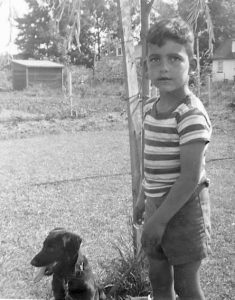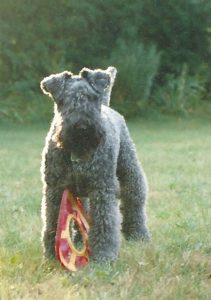
It was a reflex. An involuntary response. It’s what I’ve always done when it starts to thunder or rain really heavily, like it did the other evening. It was during that thaw Monday night when all of a sudden we got a cloud burst over the house. Being in my office upstairs, and close to top of the house, as soon as I heard the rain begin to pound on the roof, I pushed my desk chair back, turned for the door and called out.
“It’s OK, Bud,” I said. Then, I stopped myself.
The friend I’d just tried to console wasn’t there. He hasn’t been there for about a week now. But that hasn’t stopped me from thinking he still is. And catching myself calling out to him the way I did for about 15 years, well, that’s been going on since last Wednesday. That’s when I had to make one of those difficult decisions.

Finn – his name is actually Finn, not Bud – got sick last Tuesday night. He began to quiver and sweat and stare straight ahead. I didn’t know what to do since he couldn’t tell me what was wrong. But I stayed up all night stroking the back of his head, until he and I finally fell asleep. A few hours later I took Finn to the veterinary clinic.
“I could do a whole bunch of diagnostics and tests,” Wayne Cole said.
“No, Doc,” I said. “No dramatic measures. He’s a 15-year-old dog. He’s been my Bud. He’s hurting, and…
“It’s time,” Wayne said. And I nodded.
Finn – we used to call him Finn McCool, like the benevolent Irish giant – was a Kerry blue terrier. And while for part of his early life, when our daughters were still around the house, he was the family dog, for most of his life he was my canine companion. I fed and watered him every day. I walked him every day. He slept just outside the bedroom door every night.
And probably most important of all, when I sat here in my office, writing hour after hour after hour, he sat either at my feet, next to my chair, or at the entrance to my office. (He was my writing buddy through at least four book manuscripts and 15 years of Barris Beats). And usually about 4 or 5 o’clock each afternoon he’d begin to look at me with great expectation.
“OK, Bud, I know,” I’d say. “It’s time for a walk.”
Hearing those words, he’d be off like a shot, bounding around, leading me to his leash and all but opening the front door with his teeth to head for the park for his run. It really was therapeutic. All those years Finn thought those walks were for him. Actually, they were as much for me, to get me up from my computer chair, to get me some fresh air, to clear the cobwebs from my brain and to get me to stop generating words, in favour of generating steps.
And we’d talk on those walks too. You know what I mean. I’d talk through a writer’s block moment. Or, I’d vent about this problem or that. I’d plan things out loud. And every time I spoke, he’d wait for a word he understood, or his name, and give me a knowing look back. That’s the way dogs talk. It’s dog-alogue.
I’ve had dogs in my life since I was a child. I’ve loved having that sense of never being alone, knowing a dog was there. It must be something primal. I’m sure it’s the same for those who’ve had cats or birds or fish or hamsters as pets. But our dogs have served more than just my family.
In the 30 years we’ve lived here, the two Kerry blues we’ve had over that time, also connected with my long-time neighbour Ronnie Egan, a Second World War vet. All the years I commuted from town to the city to teach, the last thing I did each early morning, was throw open the door, look to Ronnie’s back door, also thrown open, and Finn knew the rest.
“Go see Ronnie!” I’d say. And Finn would bound through darkness, snow drifts or pouring rain and he’d be Ronnie’s companion for the day. And vice versa. I suspect they both lived longer, richer lives because each adored the other. Now they’re both gone.
What’s hardest to get past are the habits. After the vet put Finn down, my wife gently tidied up some of the spots that were his spots around the house. Where he ate. Where he slept. Where his toys were gathered; there’s still the Frisbee sitting, waiting for me to throw it for him. Each of the rugs where he used to lie down, I find my eye still searching to find him. My guess is this won’t stop completely. The next time the rain starts pounding on our rooftop and I quickly turn to calm Finn, he still won’t be there.
And it won’t be raindrops watering my eyes either.
Hi Ted:
I just read your heartfelt tribute to Finn. I, too, (as most people) have lost a much-loved furry family member. I sometimes think that (although this may sound cold) it might even be more difficult than losing a human, because our pets are always there for us, they don’t talk back, they love us unconditionally, they console us when we are sad and laugh with us when we are joyful, and who do you know that is always beyond excited to greet you at the door when you arrive home? We lost our Emma almost 3 years ago and I still grieve her loss. I still can’t watch the slideshow that I created as a tribute to her the entire way through without breaking down.
Your beautiful and expressive memoire to Finn made me cry, Ted. Thank you for sharing your love for Finn so openly.
Finn is out of his discomfort now. You showed him the most unselfish act of love that one can ever show by letting him go……..you repayed him for the devotion and love that he shared with you over the last 15 years.
My thoughts and prayers are with you Ted, for gentle healing over time.
Warm regards,
Sherry Cockburn
Oh Ted, I’m so sorry to hear about Finn. Yes, it is so difficult making decisions like that. It would be easier to just have family pets die on their own. But sadly, that was not the situation here and you did the right thing. I know how you’ll miss him: been there, done that. It never gets old.
P.J.
In response to Ted’s recent column in the Uxbridge Cosmos, I sent the following as a Letter to the Editor:
Frequently people will ask if I have any children. My answer always is, yes and I have two – each with four legs – a horse (Shadow) and a dog (Mr. Chips) Now, of course, Shadow does not live with me in my home, rather he resides at a wonderful equestrian centre. He has been my equine partner for the past 16 years. “Chips”, on the other hand, lives with me. As Ted pointed out, our canine companions are just as much a part of our families as the human members. They read us perfectly and direct us very well. They love routine and object to any disruption(s) in the way their (our) day proceeds. When “the time comes”, to say goodbye to our beloved animal companions, the impact is incredibly powerful and overwhelming. A huge and residual hole is left in our hearts. Our grieving may continue for a very long time. Some people don’t understand these relationships at all. They may say “Oh it was just a a dog, a cat or a horse – so get over it”. Usually such folks have never had any relationship with a pet. Instead, I would gently suggest that empathy and compassion should be extended to those who are experiencing such loss, even if you don’t understand or “get it”.
The world is indeed a much better and warmer place because animals make it so.